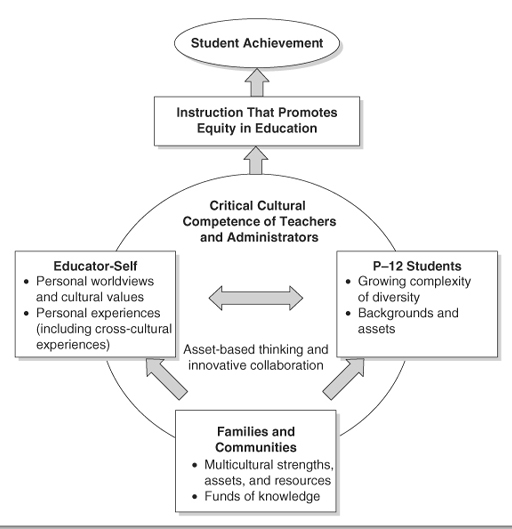2.1 Cultural competence
Cultural competence requires that, as an educator, you possess interpersonal awareness, an interest in cultural knowledge and the skills to provide learning conditions conducive for learners coming from cultures other than your own, and/or the mainstream culture in which your educational institution exists (Seeleman et al., 2009). This involves a willingness to understand cultural beliefs, values, attitudes, traditions and language preferences which may differ from your own. It requires a curiosity about the learner’s position and background, and how these may impact on their mental health, and any mental health conditions they may experience, as well as a willingness for ongoing reflection on your own cultural background and assumptions. Without cultural competence, it can be challenging to build effective professional relationships for education, and inclusion can be compromised.
Figure 1 is a model for cultural competence originally used in health care. It demonstrates the attributes necessary to achieve cultural competence, namely cultural awareness, cultural skill, cultural desire, cultural encounters and cultural knowledge.
The knowledge and skills for inclusively involving other cultures that are embodied in cultural competence also involves ‘cultural humility’. This refers to the need to reflect on your own cultural background and assumptions, including your values, practices and responses. It also requires a willingness to be open to learning new things about unfamiliar cultures and not assuming that one is ‘better than’ or ‘superior to’ another. Your cultural humility can help learners to consider and communicate their needs and practices and to view them not so much as ‘other’ than the mainstream, but as equally valid and worthy of exploring and communicating. This can support the levelling up of cultural inequalities for learners. More recent models of cultural competence, such as Cooper et al.’s (2011) Critical Cultural Competence model, include the need for self-reflection, and consider cultural knowledge exchange as a dynamic process, which cannot be learned from books, but which requires dialogue and an open attitude with learners and communities.
Activity _unit7.3.1 Activity 5 Reflecting on your cultural competence
This activity invites you to reflect on your own cultural competence, and cultural humility, by thinking about and writing notes on the following.
Do you enjoy teaching learners from other cultural backgrounds to your own or do you find it challenging? (Answer honestly, as this is for your own reflection and learning and you do not need to share this with anyone else.) If you answer positively, what enables your enjoyment and how could you further develop your competence and skills in this area? Or, if you find it challenging, what might be the particular challenges and how might you resolve them?
Considering Cooper et al.’s (2011) model above, reflect on your own level of cultural awareness, cultural skill, cultural desire, cultural encounters and cultural knowledge. Consider your ‘cultural humility’. What are your cultural assumptions, including your values, practices and responses, and how open are you to learning about cultures that may be unfamiliar to you?
Discussion
Based on your reflections and Cooper’s model, think about ways in which you might develop your cultural competence knowledge and skills and ways in which this might enhance your support for learners from diverse backgrounds. This will also be covered in the final section of this week.


